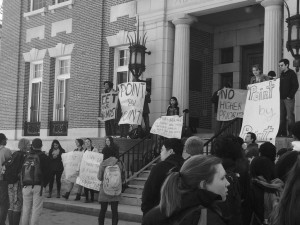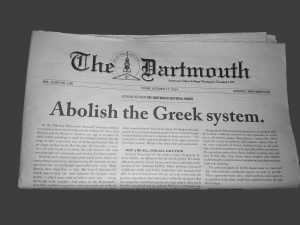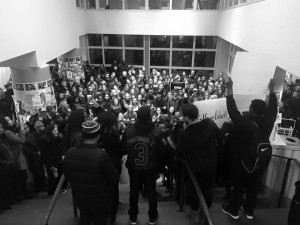Editor’s Note: This piece originally ran in the Finals Issue of the Fall of 2014. It has been updated with the past two years of scandals and presented here for reference in the modern Dartmouth era.
2012
January 25 – Lohse’s First Column – The now-infamous Andrew Lohse publishes his initial (and quite dubious) exposé of Dartmouth’s hazing rituals as an opinion piece in The Dartmouth. This preliminary exposure does not quite reach the degree of publicity as do his later endeavors (see March 28), but this column ultimately gets the ball rolling for the next few years of Dartmouth controversies.
March 23 – Departure of President Kim – President Kim announces his departure from Dartmouth after being called on by President Obama to head the World Bank. Stating that “the prospect of leaving Dartmouth at this stage is very difficult,” Kim seems to recognize the looming distress in which the College will soon be engaged, but ultimately leaves after winning the election in April. He is replaced by Interim President Carol Folt.
March 28 – “Confessions of an Ivy League Frat Boy” – This Rolling Stone article by Janet Reitman brings Dartmouth’s issues to the mainstream. This article explores the alleged abuses perpetrated upon Lohse and many others in the SAE fraternity (claims that will afterward be summarily refuted by a plethora of brothers). Regardless, with a total of over 20,000 shares on social media, the negative impact of this piece on public perception of Dartmouth cannot be understated.
April 9 – Fallout – Dartmouth alumna from the class of 2009 Ravital Segal, a sister at Kappa Kappa Gamma sorority, follows up Lohse’s claims with her own revelatory column in the Huffington Post. Segal details her own experience with hazing while criticizing President Kim for his “fear of reduced alumni giving and campus tension.”
Fall of 2012 – Alpha Phi Alpha Incident – Yesuto Shaw joins the ever-growing list of whistleblowers as he brings to light incidents of hazing at Alpha Phi Alpha fraternity, in which pledges were allegedly beaten. This event draws especial controversy because of the relatively light punishment dealt to the fraternity, which many attribute to racial bias.
2013
March 31 – Clery Act Investigation – A group of Dartmouth students files a complaint with the Department of Education under the 1990 Clery Act. They claim the school “violated students’ civil rights by not thoroughly investigating sexual assaults, and failed to obey the Clery Act, a federal law that mandates the accurate tracking and public disclosure of crime statistics on campus, including sex offenses.”
April 19 – RealTalk / Dimensions Protests – Another group of students in the student organization RealTalk launches a protest during Dimensions, the weekend-long event centered around incoming students. The protest calls attention to “homophobia, sexual assault and racism on Dartmouth’s campus.” Ultimately, the protesters are charged with violating the College’s Code of Conduct. Classes are canceled on April 24 and replaced with opportunities for discourse on the aforementioned issues on campus.
May 2 – Parker Gilbert Assault – Then-freshman student Parker Gilbert allegedly rapes another freshman student in the early morning after a night of partying. Gilbert is initially charged with four counts of aggravated felony sex assault.
July 1 – Hanlon Takes Office – Current President Philip Hanlon joins Dartmouth as its eighteenth president. Hanlon is a member of the Dartmouth class of 1977 and Alpha Delta fraternity. Upon assuming office, Hanlon remarks that he is “excited to be leading Dartmouth in a period when I believe higher education is going to change in important ways.”
July 26 – Bloods & Crips Party – A party organized by Greek organizations Alpha Delta and Tri-Delt is deemed racist after encouraging students to dress up as members of an infamous predominantly black Los Angeles-based street gang. The event drew significant negative media attention, prompting a release from AD stating that “While there was never any ill intent in the party’s theme, the gravity of our oversight is now apparent to us.”
Fall – The Beta Files – A series of private email exchanges by members of Beta Alpha Omega fraternity surface, publicized on Gawker. The emails detail hazing and pledge rituals. The fraternity is placed on probation for hazing and providing alcohol to minors, most significantly due to the providing of alcohol to an individual who allegedly perpetrated a sexual assault.
2014
January 10 – B@bB Rape Guide – A “rape guide” is anonymously posted to popular Dartmouth student message board Bored @ Baker. The post details how one should behave in order to sexually assault a specific fellow classmate, a freshman girl, on campus at the time. The author of the post is no longer a student at the College and the case is placed under review by the Committee on Standards. Backlash is primarily targeted at the website, even though it is a forum public to all Dartmouth students.
February 24 – The Freedom Budget – This now-infamous collection of radical suggestions (still available online for your reading pleasure) is sent to 13 different Dartmouth administrators. Over seventy students participate in the drafting of this list, seeking to “eradicate systems of oppression [namely racism, classism, sexism, heterosexism, and ableism] as they affect marginalized communities on this campus.” The College offers no immediate, detailed response.
March 14 – Ultraviolet Petition – US-based fringe feminist organization Ultraviolet releases a petition with over 50,000 signatures demanding that Dartmouth “take sexual assault seriously.” Regardless of the college’s recent million-dollar-plus initiatives aimed at risk reduction, the organization’s leadership continues the College’s “long history of students and faculty demanding better response to sexual assault.”
March 27 – Parker Gilbert Acquittal – Gilbert is found not guilty and acquitted of all charges in a trial that epitomizes the ambiguity of “drunken, awkward, college sex” and nonconsensual intercourse. The decision results in public outcry amongst a plethora of organizations, including WISE, drawing skepticism with regards to Dartmouth’s recent commitment against sexual assault.
April 2 – Freedom Budget Protests/Sit-In – Over seventy students affiliated with the drafting of the Freedom Budget launch a sit-in protest in President Hanlon’s office in a movement deemed “Occupy Parkhurst.” Ten students elect to stay overnight in the office, though ultimately their demands (namely, a specific response to all of the Freedom Budget’s points) are not met. President Hanlon offers a campus-wide response, stating “progress cannot be achieved through threats and demands. Disrupting the work of others is counter-productive.”
April 5 – Ultraviolet Reprise – Feminist organization Ultraviolet follows up on their earlier petition by launching a series of social media advertisements that specifically target Dartmouth for the College’s alleged “rape problem.” Many students respond over social media, criticizing the aggressive nature of the advertisement campaign, which is later expanded to target many more schools.
April 16 – The Steering Committee – President Hanlon launches the Steering Committee’s process of review and recommendation for the College. This is part of a greater campaign termed Moving Dartmouth Forward. Students, faculty, administrators, and alumni are all invited to be a part of this decision-making committee whose deliberation is still ongoing.
April 25 – Phiesta – Yet another Dartmouth party, this one thrown to raise donations for cardiac assistance, is canceled due to its perceived racist and culturally-inappropriate nature. The theme of the party, organized by Greek organizations Phi Delta Alpha and Alpha Phi, is inspired by Cinco de Mayo, and accordingly inspires an offended student to announce that “it was sadly unsurprising that a culturally-themed party was seen as a casual venture for such a privileged institution.” Phi Delt (and Dartmouth Review) President Taylor Cathcart sardonically supports the cancellation, explaining, “We felt that the possibility of offending even one member of the Dartmouth community was not worth the potential benefits of having the fundraiser.”
September 22 – Pledge Term “Ends” – Dartmouth’s Interfraternity Council, or IFC, decides in an unanimous vote to abolish the institution of the pledge term amongst all Greek organizations, stating in the campus-wide email that “New members will enjoy full rights and privileges of current members.” The efficacy of this ban is uncertain and controversial, with many believing that any hazing (which, with the transparency of pledge term, was formerly benign) will simply be forced underground.
October 17 – The Last Word – The Dartmouth’s editorial board releases their weekly Verbum Ultimum column, plastering the front of the paper with an editorial egregiously entitled “Abolish the Greek system.” The editorial is met with widespread student ire and backlash against the supposedly objective paper for producing such a heavily-biased issue. Several students quit in protest, and the paper continues to be heavily criticized for the headline.
November 3 – Faculty Jump on Board – A 116-13-3 vote at a faculty meeting passes a motion expressing support for the abolition of the Greek system. The vote comes in wake of an open letter published by a group of faculty that ultimately gathered over 200 signatures. Though the motion carries no actual weight in the process to end the Greek system, the disdain shown to a crucial population of Dartmouth affiliates is a significant blow to proponents of the system.
2015
January 29 – Moving Dartmouth Forward – In an early-morning speech, President Hanlon finally unrolls his long-awaited and controversial plans for the future of the College. These plans include a residential housing system (set to begin at the beginning of the 2016 school year), an intensified campaign against sexual assault, implementation of a new Student Code of Conduct (in addition to heightened standards for student organizations), strengthened academic rigor, and, most notably, a ban on hard alcohol. Hanlon’s plans are, unsurprisingly, not particularly well received.
April 20 – AD Derecognized – In the first and perhaps most devastating blow to Dartmouth’s Greek system, the administration finally brings down the hammer upon the College’s most famous fraternity, Alpha Delta. The derecognition stems from the alleged branding of pledges, in addition to a “three-year history of disciplinary violations – including hazing, serving alcohol to minors and hosting unregistered parties.” The fraternity follows up with an appeal process through Hanover’s zoning board, which was ultimately resolved the following year. AD’s physical plant now sits on East Wheelock Street with boarded up windows and doors.
May 2 – Derby Protests – Following the uprisings in Baltimore, a group of Dartmouth’s left-wing students launch a Black Lives Matter protest at KDE’s annual Derby party and AXA’s Pigstick. Scandal erupts after a video emerges of Student Assembly President Frank Cunningham yelling in the face of the protesters, who had allegedly personally insulted him. Cunningham issues an apology and brushes off calls for his resignation. The controversy rears its head nearly a year later on April 6, 2016, when the party theme is changed to “Woodstock” in a near-unanimous vote by the sorority. Then-Vice President of KDE Nikol Oydanich justifies the decision with the claim that the Derby theme is “related to pre-war southern culture. Derby was a party that had the power to upset a lot of our classmates.”
October 13– Columbus Day Flyers – In the early hours of Columbus Day, flyers pop up around campus advertising “Columbus Day vintage apparel” featuring the Dartmouth Indian head image. The College’s Native American community breaks out in uproar over the “racially charged, violent attack” on Indigenous Peoples’ Day. The culprit behind the flyers remains unknown, though many are quick to point fingers at the Review.
November 5 – Pong Table Theft – An unknown group of individuals, who are identified only as “concerned upperclasswomen,” break into Theta Delta Chi fraternity and steal a pong table emblazoned with the Dartmouth Indian head and the words “Boom Boom Lodge.” The scandal prompts renewed campus discussion on the topic of the “dehumanizing and racist” imagery.
November 11 – Black Lives Matter Protests – Over one hundred students in support of the Black Lives Matter movement charge into the Baker-Berry Library and, during finals period, engage in a loud, disturbing protest. The protesters’ actions included yelling at studying students, confronting individuals about whether or not they believe that “Black lives matter,” and chanting obscenities at white students. Reports of violent altercations have not been confirmed. The incident draws national attention and a weak (at best) condemnation by the administration. Controversy continues when Vice Provost for Student Affairs Inge-Lise Ameer is caught on tape calling the protest a “wonderful, beautiful thing” and claiming the existence of “a whole conservative world out there that’s not very nice.”
November 15 – Snow Justice Snow Peace – An email from various left-leaning student organizations calls for the changing of the “Seuss on the Loose” Winter Carnival theme to “Snow Justice, Snow Peace,” which would center around social justice and even feature a visit from radical political theorist Cornel West. The proposed change is met with stark backlash from the general student body, and while additional social justice-themed events are held during Winter Carnival, the petition to change the theme falls flat.
2016
February 4 – SAE Derecognized – The administration takes down its second fraternity in recent memory in their war on Greek life. After unfounded (later proven so in court) allegations of hazing, Sigma Alpha Epsilon fraternity is handed a suspension by their national chapter and a derecognition from the College. As SAE owns the land upon which a part of the Baker-Berry Library is built, their physical plant remains in operation.
Week of May 9 – #Fight4FacultyofColor – Controversy comes to a head regarding the denial of tenure to Assistant Professor Aimee Bahng, a professor in the English department. Students cite structural racism and their own personal relationships with Dr. Bahng while asserting that she deserves tenure. A public demonstration follows on May 27. The situation prompts widespread student discussion regarding such issues on campus, including a faculty petition and new committees from the administration.
May 12 – Blue Lives Matter – Dartmouth’s College Republicans put up a board in Collis in honor of National Police Week, including the phrase “Blue Lives Matter” as part of the display. Within hours, the board is ripped down by other students and replaced by black flyers that read “You cannot co-opt the movement against state violence to memorialize its perpetrators. #blacklivesmatter.” Additional flyers are posted around featuring a picture of the College Republicans posing with Donald Trump emblazoned with aggressive statements. The College responds by affirming the Republicans’ right to post on the board. Hanlon enters the fray with a campus email regarding the importance of freedom of expression and open discourse. The events draw national media attention.
May 17 – Class Petition – Class of 2016 President Danny Reitsch, with the support of other student leaders, launches a petition to the administration and Board of Trustees humbly requesting that the College’s leadership “depart from the realm of student life and instead expend every possible effort to eliminate unnecessary costs so that the school can refocus on the elements that once made Dartmouth a truly unique College.” The petition is generally well-received and gathers nearly 2000 signatures. In addition, the 2016 Class Gift rate drops to just 30%, by far the lowest participation rate in years.
Fall 2016 and the Future – Uncertainty – The future of political tensions at the College is uncertain. A visit by controversial conservative speaker Milo Yiannopoulos on November 1 passes without incident. The surprising election of Donald J. Trump as President of the United States strikes the liberal population with a heavy blow. Countless tears are shed, and a public “Walk of Solidarity” occurs the day following the election – naturally, effecting zero change, but again, passing without incident. However, the black cloud of the past several years still hangs heavily overhead. It is difficult to say what the future may hold, but at the very least, the state of affairs at the College on the Hill can certainly be described as grim.




A fine recitation of some of the mostly low-lights of the past 5 years.
This is the way to look at what goes on there.
It is NOT good.
And that is a REAL problem.
Excellent untenured professors are the prime targets administrative efforts to control departments through arbitrary and capricious non-renewals of popular faculty, a nation-wide phenomenon. Professor Bahng is lucky to get away without a trumped up paper trail of deficiencies stapled to his records!